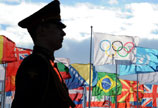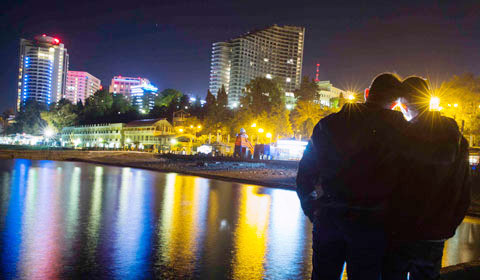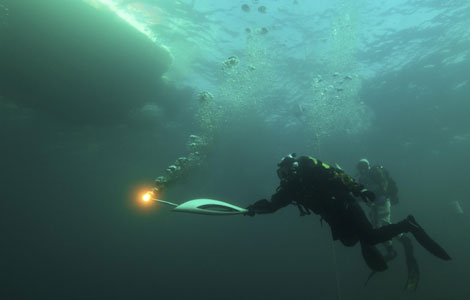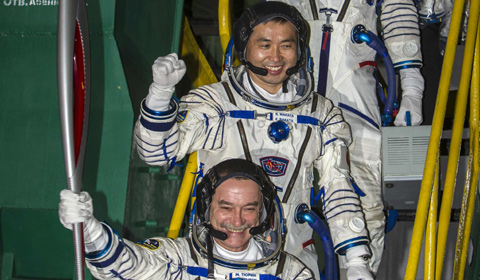High stakes for Putin at costly Sochi Games
Updated: 2014-01-26 19:05:16
( Xinhua)
MOSCOW - The Sochi Winter Olympics are meant to be Vladimir Putin's crowning achievement as Russian leader but are in danger of becoming a symbol of his country's problems.
When the Games open with great fanfare on February 7, the president will be there to revel in the unlikely feat of turning an ageing sub-tropical resort on the Black Sea into a glittering modern hub for a Winter Games in seven years.
He hopes the most expensive Games in Olympic history - summer or winter - will validate his role as Russia's supreme leader, unite the country behind him and show how far it has come since Soviet days.
"I would like the participants, fans, journalists and all those who watch the Games on television to see a new Russia, see its face and possibilities, take a fresh and unbiased look at the country," he told foreign and Russian media in Sochi.
But the preparations for the Games have also put the spotlight on Russia's problems, and the negative publicity has often drowned out the positive. Even though the facilities are now ready, his dream could still be shattered and immense damage done to his personal and political standing if they go badly.
For all his assurances that a "ring of steel" around Sochi will make the Games safe, security forces have spent the past week hunting for a woman who is suspected of planning a suicide bombing and may already be in the city.
His attempt to prove Russians are not homophobic by saying they like Elton John fell flat when the gay British singer responded by denouncing a "vicious" law Putin signed last year banning the spread of "homosexual propaganda" among minors.
Tales of corruption, outrage over his friends and allies winning lucrative Olympic building contracts, worries about damage to the environment and reports of migrant construction workers being mistreated must be ringing in Putin's ears.
The Games' projected $50-billion price tag looks even more of a gamble now that Russia's economy has taken a turn for the worse in the past few months.
"The Games are nothing but a monstrous scam," said Boris Nemtsov, a former government minister who issued a damning report last year saying about $30 billion had vanished through embezzlement and kickbacks.
STUTTERING ECONOMY
When Putin almost single-handedly won Russia the right to host the Games in 2007, the economy of the world's largest country's was in overdrive, powered by high oil prices, after registering annual growth of over 6 percent in each of the previous four years.
But that was before the 2008-09 global financial crisis, and the political and economic stagnation that has discouraged foreign investment in Russia during Putin's third term as president. Growth is expected to be only about 2 percent this year and Russian banks are starting to look badly exposed.
"I consider the bankruptcy of Russian banks that we are now seeing to be caused in no small part by attempts to promote the Olympics at the highest level," said Yevgeniya Chirikova, an opposition leader and environmental campaigner.
As Putin is so closely associated with the Games, and his legacy tied to their success, the stakes are high.
The 61-year-old former KGB spy, who has not said whether he will seek a new six-year term when his presidency ends in 2018, shows no sign of being worried by what he appears to consider background noise. His swagger, lost during big street protests against him in the winter of 2011-2012, is well and truly back.
Putin has neutralised the opposition threat, albeit by using methods denounced in the West as undemocratic, and boosted Russia's stature on the world stage, most notably by persuading Syria to give up chemical arms to avert U.S. missile strikes.
The Times newspaper in London named him "International Person of the Year" for 2013 and he topped Forbes magazine's list of the world's most powerful people.
Using a familiar tactic, he deflects criticism of the Games as Western attempts to discredit him and his country.
"We understand, and we know, and are used to it: There are always some forces that are against everything, even the Olympics project," Putin told reporters.
He sees the Sochi Games, which last until February 23, not only as a chance to give a resort loved by Joseph Stalin a makeover, but also to revive the kind of big infrastructure projects the late Soviet dictator favoured.
Sochi has long resembled a huge construction site, but now boasts hotels providing 40,000 new rooms, state-of-the-art stadiums - and a new road and railway line to the ski resort of Krasnaya Polyana that cost about $8 billion.
Putin shrugs off criticism that firms owned or run by allies or friends, such as his former judo partners Arkady and Boris Rotenberg, won most of the big Olympic contracts.
Putin said allegations of corruption were "nothing but talk", underlining that half of the budget came from private funds and half from state coffers.
TIGHT SECURITY
About 6,000 athletes, coaches and officials from around 90 countries will take part in events ranging from Alpine skiing to ice hockey and snowboarding.
Russian officials are not setting a medals target after a poor performance at the last Winter Games in Vancouver. Moscow hopes for a bumper audience, although tickets have not been selling as well as had been hoped.
The biggest potential threat to the Games is a militant attack on Sochi, which lies on the western edge of the mainly Muslim North Caucasus, scene of an insurgency aiming to create an Islamist state.
The Games will be held on territory that was the homeland of ethnic Circassians until they were expelled in the 19th century. Islamist leaders say this amounts to performing "Satanic dances" on the graves of Muslims killed fighting Russian forces and one, Doku Umarov, has urged followers to prevent the Games going ahead.
Putin has put about 37,000 personnel on combat alert in Sochi and drones and warships are being deployed. Security is also high nationwide.
But twin suicide bombings killed at least 34 people last month in the southern city of Volgograd, a gateway to the North Caucasus, underlining the difficulty of protecting every single city and potential target across the world's largest country.
Letters making a "terrorist threat" have been received by several national Olympic committees, causing a brief alert that showed how jittery the world is over security, until the International Olympic Committee said they posed no danger.
Complaining of poor communication by Moscow on Games security, former CIA director Michael Morell said this month: "I think fundamentally they don't want to admit that they don't have complete control here and they might need some help."
Another potential party-spoiler could be demonstrations over the gay propaganda law.
Calls for a boycott of the Games have failed but protests are all but certain, and will test the tolerance and the patience of the police. A crackdown by the security forces could do more damage to Putin's image than any demonstrations.
ALL RIGHT ON THE NIGHT?
In an attempt to appease his critics, Putin has relaxed a ban on protests in Sochi, and allowed some of his biggest critics out of prison, including former oil tycoon Mikhail Khodorkovsky and members of the Pussy Riot protest group.
But critics see no real change in his attitude to the opposition, who complain of a clampdown on civil liberties since he returned to the Kremlin in May 2012 after four years as prime minister because of constitutional term limits.
Critics liken the Sochi Olympic project to a "Potemkin Village", with glittering new buildings hiding crumbling homes elsewhere in the city of 350,000 people.
Some residents are unhappy with being evicted from homes that were in the path of the bulldozers, even though most of the 1,500 families were resettled in modern accommodation.
Others complain of damage to the environment, notably soil pollution from building work, or about low wages and poor conditions for migrant workers.
"Unfortunately, a lot in Russia is done in a hopelessly misguided way, and this is no exception," said Alexander Valov, a prominent Sochi blogger.
Putin is hoping the spotlight finally turns on the positive once the Games begin, and will do all he can to ensure it is a personal and national triumph, even though he denies having personal ambitions with respect to the Games.
"As you know, there is a strong connection between the Olympic Games, progress in sport and the successful development of a nation overall," he said. "I hope it will happen." ($1 = 34.1765 Russian roubles)
Photo Gallery
China Daily in Sochi
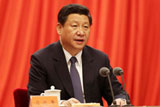
Xi set for trip to Sochi Games
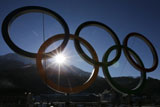
China eyes 2022 bid as it prepares for Sochi Games
Medal Count |
||||
|
1
|
|
0 | 0 | 0 |
|
2
|
|
0 | 0 | 0 |
|
3
|
|
0 | 0 | 0 |
|
4
|
|
0 | 0 | 0 |
|
5
|
|
0 | 0 | 0 |
|
6
|
||||

